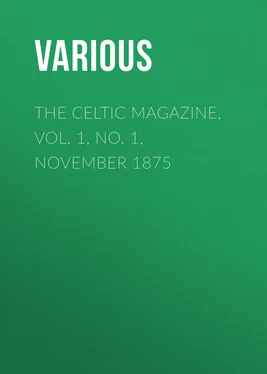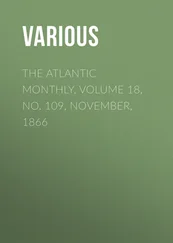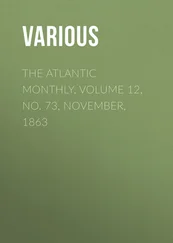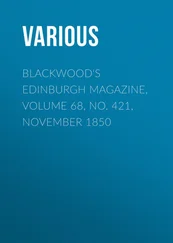Various - The Celtic Magazine, Vol. 1, No. 1, November 1875
Здесь есть возможность читать онлайн «Various - The Celtic Magazine, Vol. 1, No. 1, November 1875» — ознакомительный отрывок электронной книги совершенно бесплатно, а после прочтения отрывка купить полную версию. В некоторых случаях можно слушать аудио, скачать через торрент в формате fb2 и присутствует краткое содержание. Жанр: foreign_prose, periodic, История, foreign_edu, foreign_antique, на английском языке. Описание произведения, (предисловие) а так же отзывы посетителей доступны на портале библиотеки ЛибКат.
- Название:The Celtic Magazine, Vol. 1, No. 1, November 1875
- Автор:
- Жанр:
- Год:неизвестен
- ISBN:нет данных
- Рейтинг книги:3 / 5. Голосов: 1
-
Избранное:Добавить в избранное
- Отзывы:
-
Ваша оценка:
- 60
- 1
- 2
- 3
- 4
- 5
The Celtic Magazine, Vol. 1, No. 1, November 1875: краткое содержание, описание и аннотация
Предлагаем к чтению аннотацию, описание, краткое содержание или предисловие (зависит от того, что написал сам автор книги «The Celtic Magazine, Vol. 1, No. 1, November 1875»). Если вы не нашли необходимую информацию о книге — напишите в комментариях, мы постараемся отыскать её.
The Celtic Magazine, Vol. 1, No. 1, November 1875 — читать онлайн ознакомительный отрывок
Ниже представлен текст книги, разбитый по страницам. Система сохранения места последней прочитанной страницы, позволяет с удобством читать онлайн бесплатно книгу «The Celtic Magazine, Vol. 1, No. 1, November 1875», без необходимости каждый раз заново искать на чём Вы остановились. Поставьте закладку, и сможете в любой момент перейти на страницу, на которой закончили чтение.
Интервал:
Закладка:
Various
The Celtic Magazine, Vol. 1, No. 1, November 1875 / A Monthly Periodical Devoted to the Literature, History, Antiquities, Folk Lore, Traditions, and the Social and Material Interests of the Celt at Home and Abroad
INTRODUCTORY
In the circular issued, announcing the Celtic Magazine, we stated that it was to be a Monthly Periodical, written in English, devoted to the Literature, History, Antiquities, Traditions, Folk-lore, and the Social and Material Interests of the Celt at Home and Abroad: that it would be devoted to Celtic subjects generally, and not merely to questions affecting the Scottish Highlands: that it would afford Reviews of Books on subjects interesting to the Celtic Races—their Literature, questions affecting the Land—such as Hypothec, Entail, Tenant-right, Sport, Emigration, Reclamation, and all questions affecting the Landlords, Tenants, and Commerce of the Highlands. We will also, from time to time, supply Biographical Sketches of eminent Celts at Home and Abroad, and all the Old Legends connected with the Highlands, as far as we can procure them, beginning with those of Inverness and Ross shires.
We believe that, under the wiser and more enlightened management now developing itself, there is room enough in the Highlands for more Men, more Land under cultivation, more Sheep and more Shepherds, without any diminution of Sport in Grouse or Deer: that there is room enough for all—for more gallant defenders of our country in time of need, for more produce, more comfort, and more intelligence. We shall afford a medium for giving expression to these views. When submitting the first number of the Magazine to the public, we think it proper to indicate our own opinion on these questions at greater length than we could possibly do in a circular; but, while doing this, we wish it to be understood that we shall at all times be ready to receive contributions on both sides, the only conditions being that they be well and temperately written, and that no side of a question will obtain undue prominence—facts and arguments alone allowed to work conviction. Thus, we hope to make the Celtic Magazine a mirror of the intelligent opinion of the Highlands, and of all those interested in its prosperity and progress.
In dealing with Celtic Literature, Antiquities, Traditions, and Folk-lore, we must necessarily be Conservative. It is impossible for a good Celt to be otherwise than conservative of the noble History of his Ancestors—in love and in war, in devotion and daring. If any should deem this feeling on our part a failing, we promise to have something to say for ourselves in future, and not only give a reason for our faith, but show that we have something in the Highlands worth conserving.
In dealing with the important question of Sport, we cannot help taking a common sense view of it. We cannot resist the glaring facts which, staring us in the face, conclusively prove that the enormous progress made in the Highlands during the last half century, and now rapidly going on, is mainly due to our Highland Sports. A great amount of nonsense has been said and written on this question, and an attempt made to hold grouse and deer responsible for the cruel evictions which have taken place in the North. Arguments, to be of any force, must be founded on facts; and the facts are, in this case, that it was not grouse or deer which caused the Highland evictions, but sheep and south country sheep farmers. The question must be argued as one not between men and deer, but between men and sheep, and sheep against deer. We believe there is room enough for all under proper restrictions, and, to make room for more men, these restrictions should be applied to sheep or deer.
We believe that it would be a wise and profitable policy for Landlords as well as for Tenants to abolish Hypothec and Entail, and to grant compensation for improvements made by the latter. We are quite satisfied from experience, that the small crofter is quite incapable of profitably reclaiming much of our Highland Wastes without capital, and at the same time bring up a family. If he is possessed of the necessary capital, he can employ it much more advantageously elsewhere. The landlord is the only one who can reclaim to advantage, and he can hardly be expected to do so on an entailed estate, for the benefit of his successors, at an enormous rate of interest, payable out of his life-rent. If we are to reclaim successfully and to any extent, Entail must go; and the estates will then be justly burdened with the money laid out in their permanent improvement. The proprietor in possession will have an interest in improving the estate for himself and for his successors, and the latter, who will reap the greatest benefit, will have to pay the largest share of the cost.
Regarding Emigration, we have a matured opinion that while it is a calamity for the country generally, and for employers of labour and farmers in particular that able-bodied men and women should be leaving the country in their thousands, we unhesitatingly assert that it is far wiser for these men and women to emigrate to countries where their labour is of real value to them, and where they can spend it improving land which will not only be found profitable during their lives, but which will be their own and their descendants freehold for ever, than to continue starving themselves and their children on barren patches and crofts of four or five acres of unproductive land in the Highlands. We have experienced all the charms of a Highland croft, as one of a large family, and we unhesitatingly say, that we cannot recommend it to any able-bodied person who can leave it for a more promising outlet for himself and family. While we are of this opinion regarding voluntary emigration, we have no hesitation in designating forced evictions by landlords as a crime deserving the reprobation of all honest men.
We shall also have something to say regarding the Commercial Interests of the Highlands—its trade and manufactures, and the abominable system of long Credit which is, and has proved, so ruinous to the tradesman; and which, at the same time, necessarily enhances the price of all goods and provisions to the retail cash buyer and prompt payer. On all these questions, and many others, we shall from time to time give our views at further length, as well as the views of those who differ from us. We shall, at least, spare no effort to deserve success.
The Highland Ceilidh will be commenced in the next number, and continued from month to month. Under this heading will be given Highland Legends, Old Unpublished Gaelic Poetry, Riddles, Proverbs, Traditions, and Folk-lore.
MACAULAY'S TREATMENT OF OSSIAN
"It's an ill bird that befouls its own nest." And this is the first count of the indictment we bring against Lord Macaulay for his treatment of Ossian. Macpherson was a Highlandman, and Ossian's Poems were the glory of the Highlands; Macaulay was sprung from a Highland family, and as a Highlandman, even had his estimate of Ossian been lower than it was, he should have, in the name of patriotism, kept it to himself. But great as was Macaulay's enthusiasm, scarce a ray of it was ever permitted to rest on the Highland hills; and glowing as his eloquence, it had no colours and no favours to spare for the natale solum of his sires. Unlike Sir Walter Scott, it can never be said of him that he shall, after columns and statues have perished,—
A mightier monument command—
The mountains of his native land.
There are scattered sneers at Ossian's Poems throughout Macaulay's Essays, notably in his papers on Dryden and Dr Johnson. In the latter of these he says:—"The contempt he (Dr J.) felt for the trash of Macpherson was indeed just, but it was, we suspect, just by chance.
Читать дальшеИнтервал:
Закладка:
Похожие книги на «The Celtic Magazine, Vol. 1, No. 1, November 1875»
Представляем Вашему вниманию похожие книги на «The Celtic Magazine, Vol. 1, No. 1, November 1875» списком для выбора. Мы отобрали схожую по названию и смыслу литературу в надежде предоставить читателям больше вариантов отыскать новые, интересные, ещё непрочитанные произведения.
Обсуждение, отзывы о книге «The Celtic Magazine, Vol. 1, No. 1, November 1875» и просто собственные мнения читателей. Оставьте ваши комментарии, напишите, что Вы думаете о произведении, его смысле или главных героях. Укажите что конкретно понравилось, а что нет, и почему Вы так считаете.












